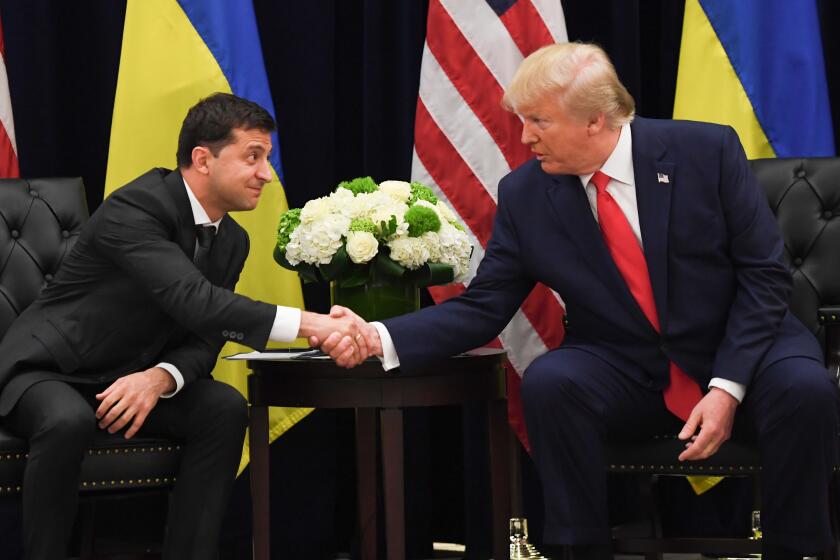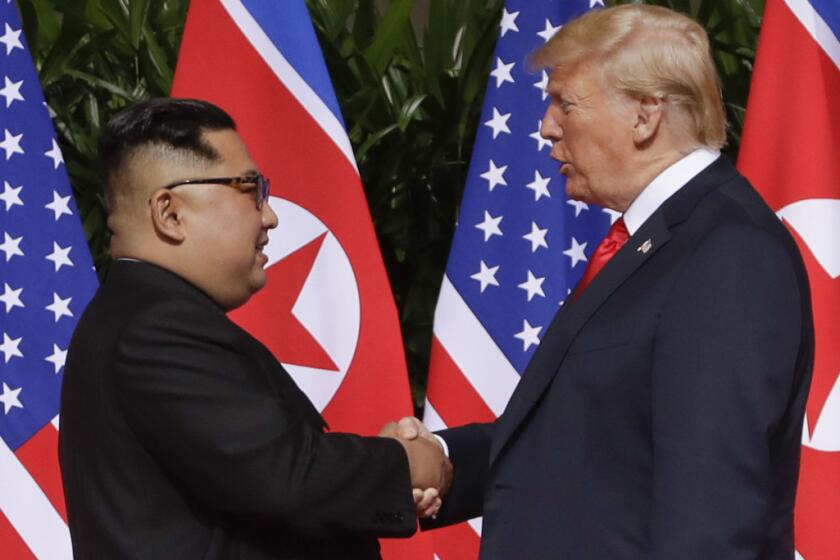‘America first’ vs. America in the world. On most foreign policy issues, Trump and Biden vary widely
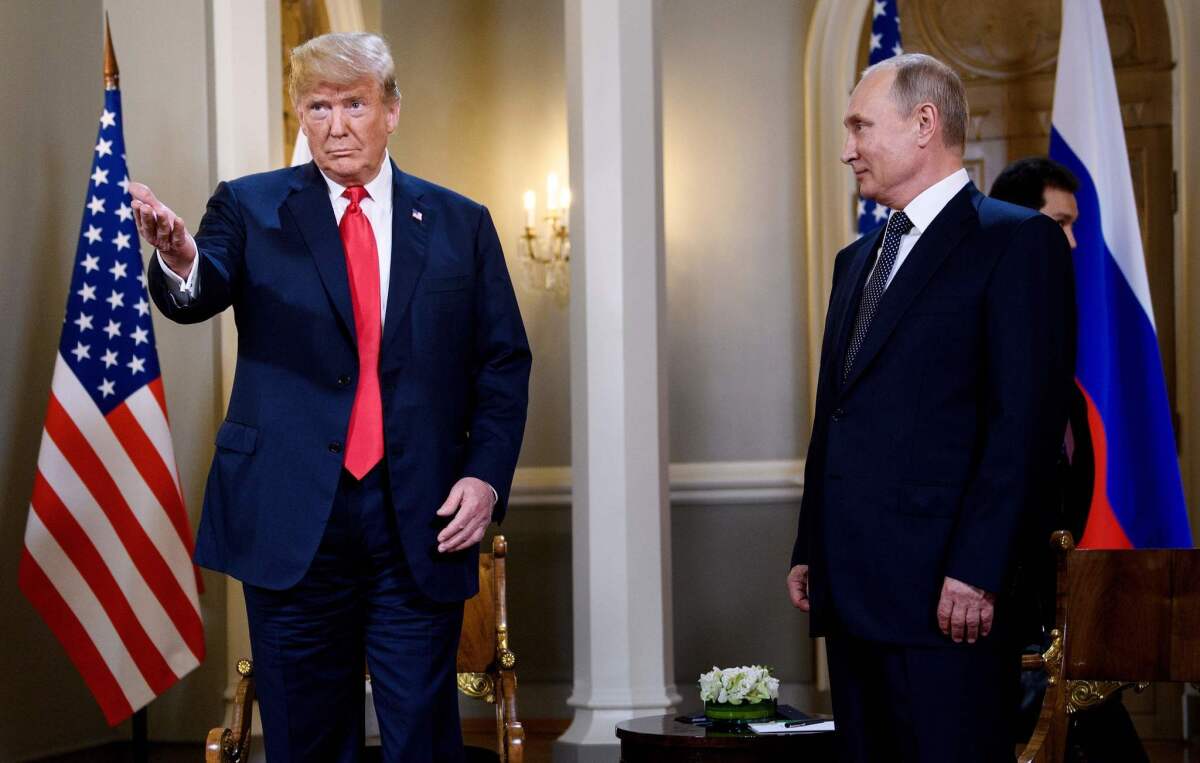
WASHINGTON — An arms extortion scandal with Ukraine; a crash-and-burn peace plan for Israel and the Palestinians; insults to allies while cozying up to adversaries — the foreign policy agenda of President Trump has been, pretty literally, all over the map.
Democratic presidential nominee Joe Biden promises significant change: discipline and consistency, as he probably attempts to dismantle many of Trump’s efforts.
Whether Biden’s positions could solve any of the global problems facing the United States is a major unknown. But Biden, through his years as vice president and senator, claims a long history in foreign policy to lean on, while Trump, by his own account, offers policies based largely on gut-level instincts and transaction.
“I know a fair amount about American foreign policy, and I have relations all over the world,” Biden said in a July news conference in Delaware. “Those who don’t like me respect me, and those who do like me respect me. ... I know how to get things done internationally.”
Trump contends that it is his own hard-knuckle style that gets things done and that Biden is too willing to appease the tough bargainers like China. Biden’s approach is anachronistic, Trump maintains.
Biden will rally allies and set a new tone, yet underneath, his China policy may look closer to Trump’s than to Obama’s a decade ago.
In campaign speeches, Biden says he will restore the United States to a leadership role on the world stage that strengthens ties with allies and stands up to adversaries. That would be a reversal of Trump’s “America first” doctrine that has seen the country retract from many of its global spheres of influence. Trump has frequently offended traditional partners such as Germany and appeared deferential with enemies including Russian President Vladimir Putin.
Iran
Biden’s advisors said a large portion of the Democrat’s foreign policy would be to “correct” what they see as Trump’s mistakes. With great fanfare, Trump pulled out of the historic nuclear deal with Iran — a crowning achievement of the Obama-Biden era — and pledged to squeeze the Islamic Republic with economic sanctions that would force it to capitulate to tougher negotiations. That did not happen, although Iran’s economy is reeling.
The administration failed to persuade European and other signatories to the 2015 deal to join in abandoning it; Iran, with little reason to stick to the agreement, has begun limited centrifuge production, and U.S. efforts now to extend a separate arms embargo at the U.N. Security Council targeting Iran are faltering.
Trump argues that his government has had “historic achievements” in pressuring Tehran, but his attention to the details appears to have subsided.
Biden would attempt to resuscitate the nuclear deal, starting with reaching out to allies “and if Tehran returns to compliance,” according to a campaign document. But it is not clear how easily all parties could be brought back into talks.
Latin America
Regime change was also one of the two pillars of Trump’s policy for Latin America. He focused on a campaign of financial and diplomatic sanctions hoping to force from power Venezuelan President Nicolás Maduro and Cuba’s ruling Communist Party.
The Obama government also placed sanctions on Maduro, but on Cuba he ended half a century of Cold War hostilities and reopened diplomatic ties. Trump in turn reversed the Cuba overture, in part to lure Florida voters, and Biden says he would revive it.
Elsewhere in Latin America, Trump had one priority: forcing Central American countries to cooperate with him on drastic measures to stop migrants and asylum seekers from crossing into the U.S. over its southern border with Mexico. After he threatened to block aid and slap tariffs on the relatively poor countries, they acquiesced.
By contrast, Biden, whom Obama put in charge of the Mexico-Central America portfolio, oversaw a broad “prosperity” program aimed at improving justice and security in those countries so that citizens would not feel the pressure to flee. It remains debatable whether the program achieved significant gains.
The Middle East
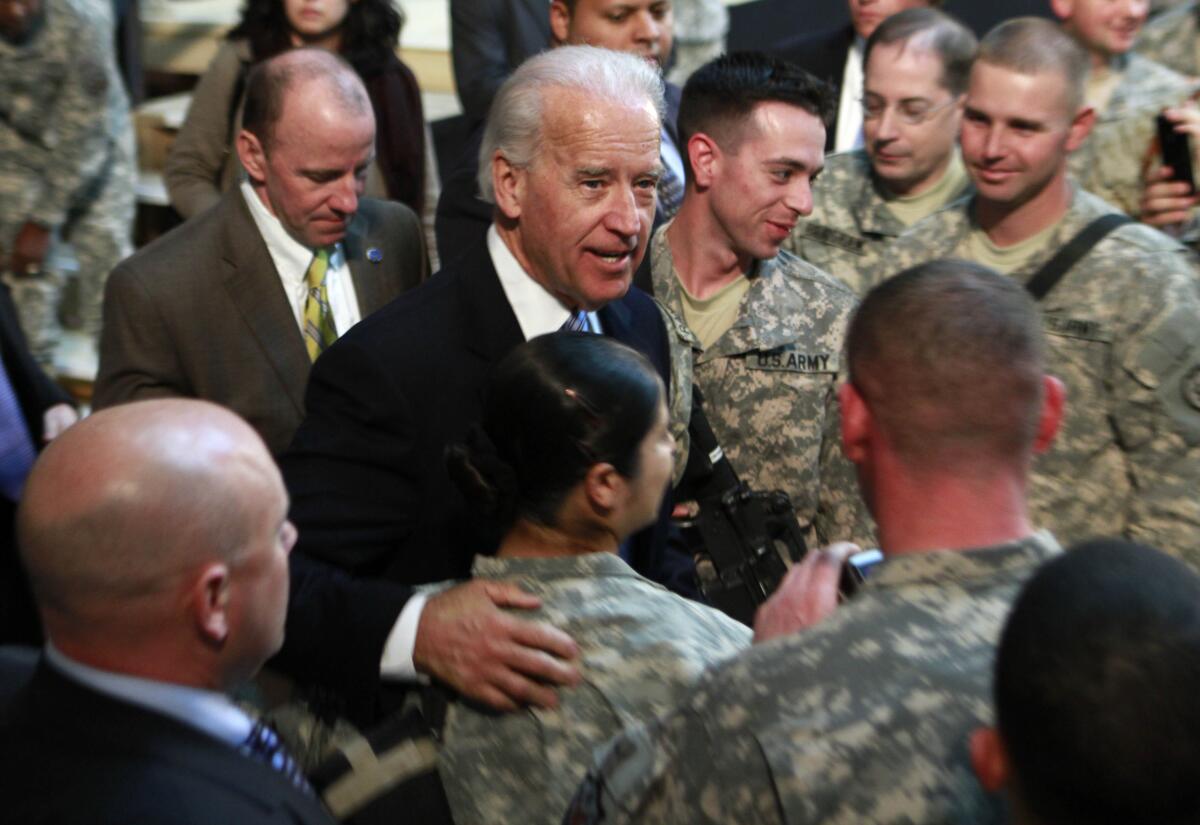
Another area of policy that has delighted and enthused Trump’s core base of supporters, but dismayed much of the world, involves the Israeli-Palestinian conflict.
Trump vowed to forge a historic deal that would bring peace to the volatile region and placed his inexperienced son-in-law in charge of it. Then he reversed decades of international policy and tradition by recognizing Jerusalem as the capital of Israel and moving the U.S. Embassy from Tel Aviv to the holy city, which is also claimed by the Palestinians.
He went on to withdraw automatic support of an independent Palestinian state to sit alongside Israel and refused to condemn Prime Minister Benjamin Netanyahu’s plans to annex much of the West Bank, home to most Palestinians.
Netanyahu famously disdained Obama, but he has known and, aides say, gotten along well with Biden for years. Consequently, few expect a return to the stormy Obama years if Biden is elected president. At the same time, he says he continues to support a Palestinian state — the two-state solution — but will not move the embassy back to Tel Aviv.
Biden says he would not kowtow to Saudi Arabia, the way he and other Democrats contend that Trump has. Even Republicans in Congress joined their Democratic counterparts to condemn Trump’s failure to hold the de facto Saudi ruler, Prince Mohammed bin Salman, accountable for the slaying of a U.S.-based Saudi journalist and the rampant killing of civilians in the Yemen civil war.
Trump says maintaining a robust relationship with Saudi Arabia outweighs other concerns, especially as Washington attempted to build an alliance against Iran, Riyadh’s archenemy, and proceeded with sales of billions of dollars in weapons to the desert kingdom. Those policies are not likely to change in a second Trump term.
Biden pledges to resume full U.S. participation in multilateral organizations, from NATO to the United Nations, and also promises to restore human rights to a core role in foreign policy and rebuild a demoralized State Department largely sidelined under Trump. The president and his top diplomat and fierce loyalist, Secretary of State Michael R. Pompeo, have sought to redefine human rights, saying the most important elements are religious freedom and property rights.
Although both Trump and Biden initially approved of the U.S.-led war in Iraq that started in 2003, they now agree essentially on withdrawing troops from several war zones, including Afghanistan.
Russia and Ukraine
On Russia, which American intelligence officials say is once again attempting to interfere in the U.S. presidential election to Trump’s benefit, Biden has said he would stand up to Moscow but has offered few specifics beyond renewing the New START nuclear arms control agreement that Trump would scuttle.
Trump, whose distortion of Biden’s anti-corruption efforts in Ukraine eventually led to the president’s impeachment, has at times seemed willing to accept Russia’s annexation of Ukraine’s Crimean peninsula. Biden says he would enforce the traditional American and international position of demanding Russia withdraw from Crimea and abandon efforts to seize eastern Ukraine. There is no evidence of wrongdoing by Biden in Ukraine, where his pressure helped lead to the firing of a prosecutor who was widely deemed to be corrupt.
Trump, noting Biden’s son had a high-paying job with a Ukrainian natural gas company, held up delivery of critical weapons to the government in Kyiv while trying to force Ukraine’s president to supply dirt on the Bidens. Trump was impeached by the House of Representatives and acquitted by the Senate.
The focus of a House impeachment inquiry is President Trump’s request of Ukraine’s leader, according to a White House memo, to investigate Joe Biden.
China
Trump started his term in office with friendly overtures toward Chinese President Xi Jinping, but a roller-coaster relationship that included trade warfare is ending on a hostile note as the administration blames China for the COVID-19 pandemic and routinely attacks the Chinese Communist Party for a host of sins.
This comes after China mounted an assertive foreign policy and made inroads in many parts of the world, something for which Biden too may share some responsibility for having failed to rein in the economic superpower in the Obama years.
It is unclear where either would go next as president, although Biden’s team says he will put more emphasis on human rights than Trump did.
North Korea
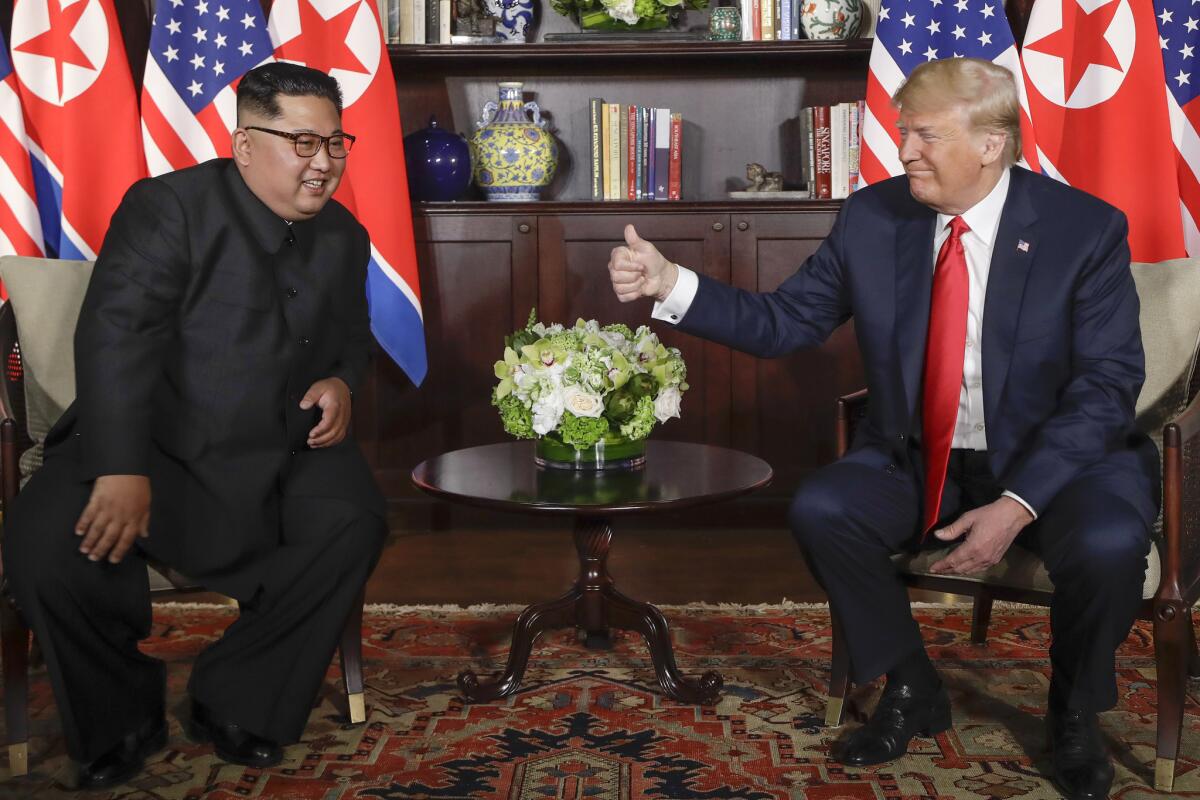
Trump’s most headline-grabbing foreign policy moves involved North Korea and his summits with leader Kim Jong Un, the first between a sitting U.S. president and a ruler from the dictatorial Kim dynasty.
Trump threatened ‘fire and fury,’ then met three times with North Korea’s ruler in an ambitious bid to seek nuclear disarmament. It failed.
While Trump contended that his meetings were designed to force Pyongyang to get rid of its nuclear arsenal, no progress was made in that area, and, in fact, most Korea experts say Kim has continued to build and test weapons.
Biden would probably return to the Obama-era approach of building up alliances against North Korea to tighten sanctions and isolate the country, an isolation that Trump helped weaken. Biden’s advisors acknowledge, however, that North Korea will remain an intractable problem and potential threat to U.S. security.
More to Read
Get the L.A. Times Politics newsletter
Deeply reported insights into legislation, politics and policy from Sacramento, Washington and beyond. In your inbox three times per week.
You may occasionally receive promotional content from the Los Angeles Times.
